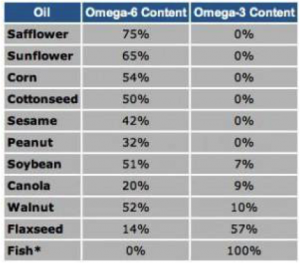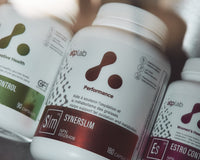Omega-3s

Naturally, everyone here has heard about omega-3 essential fatty acids, but there are some of you who don’t realize how important this specific type of lipoidal matter is to human beings. We call this group of fats ‘essential’ because the body cannot produce. Therefore, we must acquire them in the form of food so that they will be present in the human body. There are three forms of omega-3s: alpha-linolenic acid (ALA, vegetal), EAP (eicosapentaenoic acid) and DHA (docosahexanoic acid). The latter two are known as animal forms. The vegetal form is not bad, but the conversion of ALA into DHA is very slow and inefficient. The fact remains that these plant sources are still a good source of fatty acids in their natural element, such as flaxseed, chia, but not linseed oil.
Omega-3s are good anti-inflammatories and, like most illnesses have inflammatory origins, they play a major role. Do you see where I am getting to? They are essential to the organism’s proper functioning and several studies have shown that they protect the cardiovascular system and reduce the chances of a heart attack. With respect to blood pressure, for example, a meta-analysis issued by the “American Journal of Hypertension” has clearly demonstrated that the consumption of EAP-DHA, at doses as low as two grams per day (1), lowers blood pressure. Its impact on fats in the blood is quite remarkable. After eight weeks, doses as low as 1.88 g of EAP and 1.48 g of DHA helped reduce triglyceride levels in the blood by 44% and increase HDL by 8% in patients suffering from family hyperlipidemia (2). There are a fair number of ongoing studies that also evaluate their uses in the treatment of cancer, rheumatoid arthritis, irritable bowel syndrome and even lupus. Preliminary studies on rheumatoid arthritis have shown that the use of omega-3 (2.6 g per day) taken in combination with medication yields significant benefits for those with this kind of condition (3), but other studies have shown that combined doses of EAP and DHA must be higher than 3,000 mg if the individual is to truly benefit from the advantages of omega-3s (4). The conclusion remains the same: omega-3s can help reduce the need for medication and can stabilize the condition.
We really consume such small amounts of omega-3s? The answer is YES! Omega-3 consumption is at its lowest level since the middle of the 19th century. The ideal ratio of omega-6/omega-3 is between 3:1 and 1:1. The increased consumption of vegetable oil and the use of grains rich in omega-6 to feed animals for slaughter have truly upset the balance between these two lipids. Between 1935 and 1939, the ratio was estimated at 8.4:1. According to statistics, it was 1.03:1 in 1985 and according to current estimates, the ratio will fluctuate between 10:1 and 25:1 in some parts of the world. North America has one of the worst ratios. Here is a table that shows the amounts of omega-3 and omega-6 in several oils and food that we regularly consume: What can you do to promote a rebalancing of essential fatty acids?
What can you do to promote a rebalancing of essential fatty acids?
In conclusion, the current North American lifestyle is not at all ideal, but with advances in nutrition and recent discoveries, it seems clear that a diet with a high content of omega-6 is not the best choice. You certainly don’t have to take an omega-3 supplement, but slightly modifying your eating habits to at least reduce your consumption of omega-6 is recommended.
REFERENCES
Omega-3s are good anti-inflammatories and, like most illnesses have inflammatory origins, they play a major role. Do you see where I am getting to? They are essential to the organism’s proper functioning and several studies have shown that they protect the cardiovascular system and reduce the chances of a heart attack. With respect to blood pressure, for example, a meta-analysis issued by the “American Journal of Hypertension” has clearly demonstrated that the consumption of EAP-DHA, at doses as low as two grams per day (1), lowers blood pressure. Its impact on fats in the blood is quite remarkable. After eight weeks, doses as low as 1.88 g of EAP and 1.48 g of DHA helped reduce triglyceride levels in the blood by 44% and increase HDL by 8% in patients suffering from family hyperlipidemia (2). There are a fair number of ongoing studies that also evaluate their uses in the treatment of cancer, rheumatoid arthritis, irritable bowel syndrome and even lupus. Preliminary studies on rheumatoid arthritis have shown that the use of omega-3 (2.6 g per day) taken in combination with medication yields significant benefits for those with this kind of condition (3), but other studies have shown that combined doses of EAP and DHA must be higher than 3,000 mg if the individual is to truly benefit from the advantages of omega-3s (4). The conclusion remains the same: omega-3s can help reduce the need for medication and can stabilize the condition.
We really consume such small amounts of omega-3s? The answer is YES! Omega-3 consumption is at its lowest level since the middle of the 19th century. The ideal ratio of omega-6/omega-3 is between 3:1 and 1:1. The increased consumption of vegetable oil and the use of grains rich in omega-6 to feed animals for slaughter have truly upset the balance between these two lipids. Between 1935 and 1939, the ratio was estimated at 8.4:1. According to statistics, it was 1.03:1 in 1985 and according to current estimates, the ratio will fluctuate between 10:1 and 25:1 in some parts of the world. North America has one of the worst ratios. Here is a table that shows the amounts of omega-3 and omega-6 in several oils and food that we regularly consume:
 What can you do to promote a rebalancing of essential fatty acids?
What can you do to promote a rebalancing of essential fatty acids?
- Check the oils that you use every day!
- If possible, eat the meat of grass-fed animals
- Increase your consumption of fatty fish
- Use a good omega-3 supplement like the one made by ATP
- Nuts are good, but in moderation
In conclusion, the current North American lifestyle is not at all ideal, but with advances in nutrition and recent discoveries, it seems clear that a diet with a high content of omega-6 is not the best choice. You certainly don’t have to take an omega-3 supplement, but slightly modifying your eating habits to at least reduce your consumption of omega-6 is recommended.
REFERENCES





